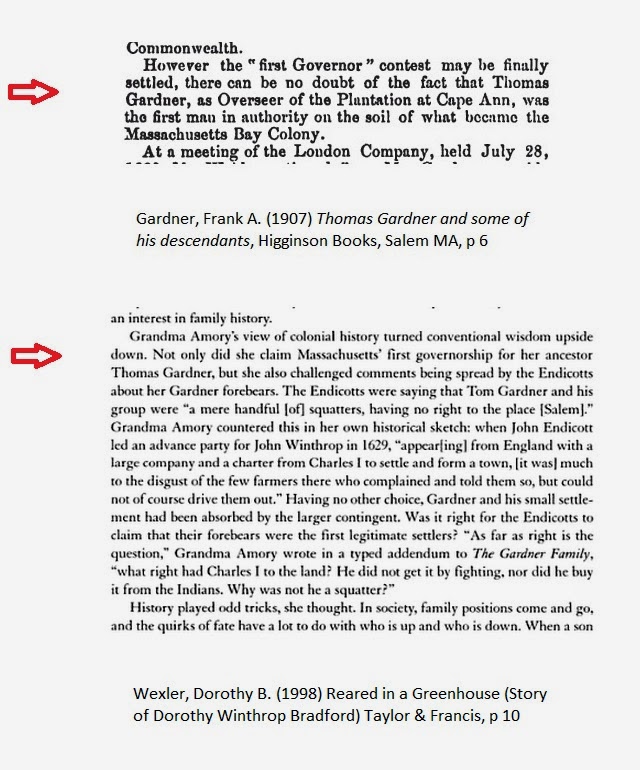 |
| Gardner's map |
See the image which can be found at American Indian Deeds (John's signature is on Section C) which was accessed from Salem Deeds.
---
John would have been young, of apprentice age, but this had to be a good experience. Dr. Frank (1907, pg 52) wrote that he "was first mentioned in the records of the 'General Court' at Boston" when the treasurer was "ordered to pay John Gardner ... for witness charge & carrying Goodman Woodward, his instruments to Ipswich."
This crew's map was used until 1652's effort at determining the northern extent of Massachusetts.
---
Note: I ran across the map while researching another topic involved with Ipswich. One intent is to gather as much as is available, and can be found, for each person of the 1st generation. Then, providing a persistent means for presentation is (will continue to be) on the table.
---
Note: I ran across the map while researching another topic involved with Ipswich. One intent is to gather as much as is available, and can be found, for each person of the 1st generation. Then, providing a persistent means for presentation is (will continue to be) on the table.
Remarks: Modified: 01/17/2022
07/27/2014 - In 1638, there was a Harvard class in progress. From the viewpoint of effectiveness required for successful establishment of a community, one can, easily IMHO, ask whether John's experience might have some, a lot IMHO, advantages over the classroom discussions related to the number of angels on a pin head (sorry, had to write that)? This is an age-old argument, very much apropos to some modern problems. We expect to address this topic, and related topics, again. For now, look at Staloff's book (see preview at Google books): The Making of an American Thinking Class (oh Lord, deliver us). I have mentioned him several times in posts. I would take 100 Thomas' as backbones and brains over any intellectual as would anyone who has to deal with reality and problems that have to be HANDled.
06/06/2015 -- Given the day, an aside: Harvard contributed, relatively in size, manpower for both WWI and WWII. In some ways, it's astonishing that the likes involved currently (and their whole worldview) is supported by those who put their lives on the line daily and not by the ilk (we can discuss this from a historical view, please). ... The school has also just picked up oodles of money which has caused some controversy. None here, as the money could go toward making their upcoming 400th more pertinent to the American (and the dream for many - say, Magna Carta) experience, as a whole. ... Another aside: John Gardner, being young, may have provided the muscle for the crew, but that type of experience is missing from the lives of many who go to the supreme, supposed (similar ilk from all over the world is attracted), academic environment (say, for instance, a draft and real contributions thereby - see above). ... Finally, the view here is not colored by the fact of being an in-law to descendants of the first head (whole tale ought to be re-visited with all sides represented).
11/23/2016 -- Looking further into Dr. Frank's periodical, "The Massachusetts Magazine," we found R.A. Douglas-Lithgow as a contributor. He also wrote on Nantucket, and more.
12/12/2018 -- Fixed link to the map which came from American Indian Deeds.
07/27/2014 - In 1638, there was a Harvard class in progress. From the viewpoint of effectiveness required for successful establishment of a community, one can, easily IMHO, ask whether John's experience might have some, a lot IMHO, advantages over the classroom discussions related to the number of angels on a pin head (sorry, had to write that)? This is an age-old argument, very much apropos to some modern problems. We expect to address this topic, and related topics, again. For now, look at Staloff's book (see preview at Google books): The Making of an American Thinking Class (oh Lord, deliver us). I have mentioned him several times in posts. I would take 100 Thomas' as backbones and brains over any intellectual as would anyone who has to deal with reality and problems that have to be HANDled.
06/06/2015 -- Given the day, an aside: Harvard contributed, relatively in size, manpower for both WWI and WWII. In some ways, it's astonishing that the likes involved currently (and their whole worldview) is supported by those who put their lives on the line daily and not by the ilk (we can discuss this from a historical view, please). ... The school has also just picked up oodles of money which has caused some controversy. None here, as the money could go toward making their upcoming 400th more pertinent to the American (and the dream for many - say, Magna Carta) experience, as a whole. ... Another aside: John Gardner, being young, may have provided the muscle for the crew, but that type of experience is missing from the lives of many who go to the supreme, supposed (similar ilk from all over the world is attracted), academic environment (say, for instance, a draft and real contributions thereby - see above). ... Finally, the view here is not colored by the fact of being an in-law to descendants of the first head (whole tale ought to be re-visited with all sides represented).
11/23/2016 -- Looking further into Dr. Frank's periodical, "The Massachusetts Magazine," we found R.A. Douglas-Lithgow as a contributor. He also wrote on Nantucket, and more.
12/12/2018 -- Fixed link to the map which came from American Indian Deeds.
01/17/2022 -- Right after the Revolution, the Head of Harvard was Samuel Webber. He was a Mathematics professor of note. Too, he did the surveying for the boundaries for the northern border (at the time) which was "recognized by the Treaty of Paris." This crucial discipline deserves more attention (search results - surveying).

